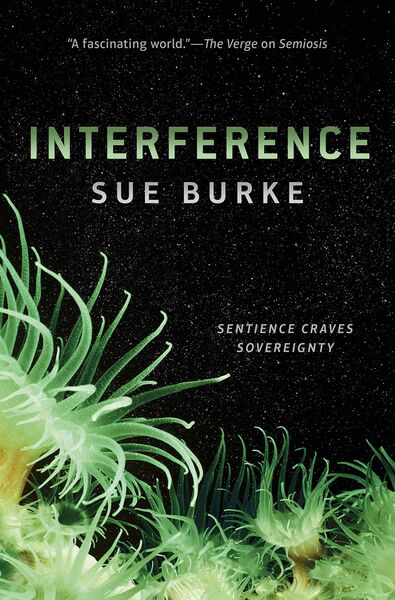A Plan As Big As The Sky
Interference (Semiosis, volume 2)
By Sue Burke

24 Oct, 2019
Sue Burke’s 2019 Interference is the second instalment in her Semiosis Duology.
Over two centuries have passed since the original human settlers first arrived at Pax, a habitable terrestrial planet over fifty light-years from Earth. During that time Earth was focused on internal matters. Now it is finally interested enough to send a follow-up mission to Pax.
Karola is very, very determined to be on that ship.
The criminal now known only as NVA orchestrated the horrific deaths of five billion people, using her food conglomerate to deliver a subtle poison to her victims. One of the dead was NVA herself, which was her way of ensuring that she would never pay for her crimes. The overbearing, patriarchal state that arose after the chaos is not the sort of state that allows mere death to get in the way of revenge. NVA may be unavailable but her genetic material survived. Clones are created to suffer NVA’s punishment in her stead.
One clone at a time is punished. Any other clones do not know that they are the genetic twins of the great criminal until their predecessor dies and it is their turn to be tortured for years. Karola has stumbled across the fact she is an NVA clone1. Thus her eagerness to travel to a world light-decades beyond the state’s reach.
Waking at Pax, Karola discovers her successful escape may only be a temporary escape. The powers-that-be back on Earth don’t particularly want the mission to linger at Pax; thus they’ve taken steps to hand command to the expedition to someone whose instincts will compel him to flee Pax as soon as possible. It’s a vexing distraction from the thrilling anthropological and biological discoveries awaiting the team on Pax.
There are other distractions The human colonists, their alien Glassmaker allies (themselves descendants of explorers from a third terrestrial world), and their mentor, the intelligent plant Stevland, have found ways to co-exist and cooperate with each other. They have created a small oasis of peace on a world whose lifeforms fight an endless war of domination and extermination against each other.
It is an oasis threatened by an enemy that the colonists have no idea exists.
~oOo~
I’ve lost track of how many novels I have read where long-isolated interstellar colonists have achieved peace and a tenuous prosperity, only for a mission from a dystopian Earth to disrupt things. In most cases the Terrans learn a sharp lesson about what happens when one blunders into a complicated situation without doing any homework. The consequences are often grim, sometimes even for Earth. This would be another example of that sub-genre. There must be a term for this sort of book, given that there are so many of them, but I do not know what it is.
This sub-genre is like generation ship stories and a lot of horror stories in that nobody involved has ever read a story in which interstellar missions backfire/generation ships devolve into cannibalism/the kids insist on going into the basement alone. The standard plot makes sense in this book because the people running Earth aren’t all that fond of preserving and disseminating information. Not irrelevant (from their POV) information and especially not information that might threaten their power. Yes, it’s quite believable that brutal, self-serving oligarchies would be inefficient and that their interstellar mission would be one big mess.
As to the world itself…
Gardens look pleasant from a distance. Up close, it’s endless competition over resources. In the particular garden that is Pax, the various gardeners (not the humans, who are merely one crop among many) disagree as to goals. If you’re looking for a pleasant comfortable world in which to spend a few hours, this is not that world.
The prose is fine. This would have been a tolerable read were it not that the narrative structure kept throwing me out of the story. The author switches viewpoints frequently. I assume that this was an attempt to give a wider perspective on what was happening. But the frequent transitions between the many characters were disconcerting and ensured that I would never really get to know any one character all that well.
Interference is available here (Amazon), here (Amazon.ca), here (Amazon.co.uk) and here (Chapters-Indigo).
1: The state’s efforts to keep clone identities secret is so successful that even the bosses do not know why Karola is so eager to escape. The encrypted identity of the next clone-to-be-tortured is revealed only when the previous torture victim dies.
